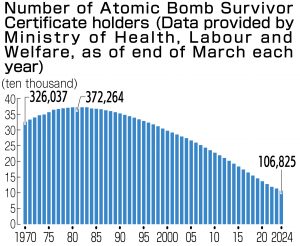Health Ministry to collect accounts of A-bomb experiences from all A-bomb survivors for first time in 30 years, to pass on experiences to next generation 80 years after atomic bombing
Feb. 19, 2025
by Fumiyasu Miyano, Staff Writer
The Ministry of Health, Labour and Welfare has decided to collect accounts of the A-bomb experiences from all survivors living in Japan in fiscal 2025. The aim of this effort is to unearth anew the tragic memories and pass them on to the next generation, as this year marks the 80th anniversaries of the atomic bombings. This is the first time in 30 years since 1995 that the ministry tries to collect accounts of experiences of all A-bomb survivors.
According to the ministry, the survey will cover A-bomb survivors living in Japan who have an Atomic Bomb Survivor’s Certificate. They will be asked to write their experiences at the time of the atomic bombing of Hiroshima or Nagasaki and their thoughts. The National Peace Memorial Halls for the Atomic Bomb Victims in Hiroshima and Nagasaki will compile the collected accounts and make them available for the public to read in the halls.
The ministry is considering sending out survey forms through local governments nationwide when they notify survivors about health check-ups. The ministry intends to “make sure that the reality of the atomic bombings is passed on to the next generation, as there will be no A-bomb survivors in the not-too-distant future.”
In fiscal 1995, the ministry asked for cooperation from about 320,000 A-bomb survivors and received responses from about 80,000 of them. In fiscal 2005 and 2015, the ministry conducted sample surveys. But this time, it will carry out a complete survey and plans to continue it in 2026 and onward. Fact-finding surveys on A-bomb survivors’ living conditions conducted every 10 years since 1965 will be discontinued, considering the burden on elderly A-bomb survivors.
Terumi Tanaka, 92, co-chair of the Japan Confederation of A- and H-Bomb Sufferers Organizations, welcomed this move, saying, “The survey will uncover more accounts of experiences. I hope they, along with other accounts that have been collected so far, will be digitized and put to good use extensively both in Japan and overseas.”
According to the ministry, the number of A-bomb survivors who hold an Atomic Bomb Survivor’s Certificates fell to 106,825 as of the end of March last year, falling below 110,000 for the first time. Their average age is the highest ever at 85.58.
(Originally published on February 19, 2025)
The Ministry of Health, Labour and Welfare has decided to collect accounts of the A-bomb experiences from all survivors living in Japan in fiscal 2025. The aim of this effort is to unearth anew the tragic memories and pass them on to the next generation, as this year marks the 80th anniversaries of the atomic bombings. This is the first time in 30 years since 1995 that the ministry tries to collect accounts of experiences of all A-bomb survivors.
According to the ministry, the survey will cover A-bomb survivors living in Japan who have an Atomic Bomb Survivor’s Certificate. They will be asked to write their experiences at the time of the atomic bombing of Hiroshima or Nagasaki and their thoughts. The National Peace Memorial Halls for the Atomic Bomb Victims in Hiroshima and Nagasaki will compile the collected accounts and make them available for the public to read in the halls.
The ministry is considering sending out survey forms through local governments nationwide when they notify survivors about health check-ups. The ministry intends to “make sure that the reality of the atomic bombings is passed on to the next generation, as there will be no A-bomb survivors in the not-too-distant future.”
In fiscal 1995, the ministry asked for cooperation from about 320,000 A-bomb survivors and received responses from about 80,000 of them. In fiscal 2005 and 2015, the ministry conducted sample surveys. But this time, it will carry out a complete survey and plans to continue it in 2026 and onward. Fact-finding surveys on A-bomb survivors’ living conditions conducted every 10 years since 1965 will be discontinued, considering the burden on elderly A-bomb survivors.
Terumi Tanaka, 92, co-chair of the Japan Confederation of A- and H-Bomb Sufferers Organizations, welcomed this move, saying, “The survey will uncover more accounts of experiences. I hope they, along with other accounts that have been collected so far, will be digitized and put to good use extensively both in Japan and overseas.”
According to the ministry, the number of A-bomb survivors who hold an Atomic Bomb Survivor’s Certificates fell to 106,825 as of the end of March last year, falling below 110,000 for the first time. Their average age is the highest ever at 85.58.
(Originally published on February 19, 2025)








